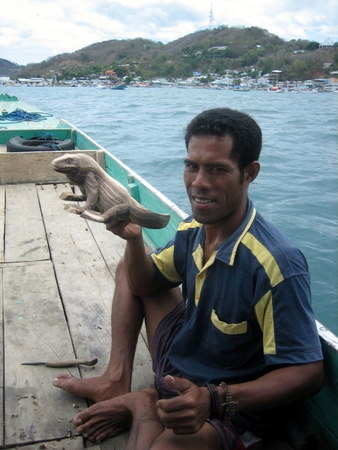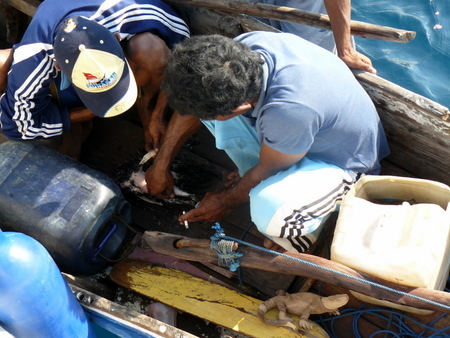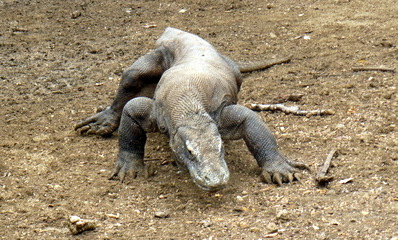Bone Rate, Flores and the Komodo National Park

JJMoon Diary
Barry and Margaret Wilmshurst
Wed 16 Sep 2009 09:12
|
"Thar she blows!"
At last, after three years of myopic peering across
the watery wastes we have seen our first whale - a solitary humpback
cruising slowly north blowing gently every two minutes. All the other
cruisers have seen dozens of the great beasts and, knowing the pathetic quality
of our look-out, have sometimes called us on the radio to report sightings in
our path. By the time we arrived the whales had scattered or
dived. Now the frustration is over. Satisfaction at last.
We can sleep easy.
From Wakatobi towards Flores we sailed
south-west and the island of Bone Rate was conveniently across
our track at about half the distance. The most interesting feature
there was the large boat building industry on the beach. There are
probably few places in the world where so many boats are being built or
renovated using only traditional tools and hand-held electric drills. All
are laid up by eye; there are no plans or drawings. We watched iron
fastenings being hammered home through thick planks and frames. The
joints between planks are filled with caulking driven in with the
traditional tool and mallet. It takes about five months to build one
of the big 100 footers (33 metres) and we were told (we think we were
told) that the large boats were then towed to Singapore to have
machinery fitted. The small ten metre boats all have single cylinder
Chinese diesel engines without gear boxes. They are said to cost
about £200. To go ahead the mate lifts a couple of loose deck
planks, drops down into the "engine room" and winds her up. To stop,
the captain pulls the decompression lever in good time and the boat carries her
way slowly until she is alongside a yacht or head-on to the quay. To help
stop at the quay the crew throw over the stern an anchor made from
bent pieces of reinforcing rod welded together. The noise of
these craft is very characteristic and can be heard at great
distances.
In fact the distant thump, thump,
thump of an approaching diesel is often enough to generate gloom and
despondency in a yachtie's breast. Fishermen use the boats all
over the country and around here many of the young men make part of
their living by serving/preying on the yachting community. Most come
from the village of Komodo and swarm round the National Park and the town of
Labuan Bajo in their long, narrow boats looking for
customers/victims. It is difficult to know how to respond sensibly and
with humanity - some of the people are so lacking in resources compared with
us. Some become rather unattractive when they plead to be given money
or possessions, but others have lovely smiles and offer a service or a fish at a
price to be negotiated. Our first transaction in Labuan Bajo was with Ben:
the purchase and delivery of 400 litres of diesel. We discovered
later that we had paid well over the odds and might have been subject to
criticism from the fleet had people found out but it did not sour our
relationship with Ben. He had to buy the fuel, carry it in 20 litre
plastic cans down to his boat on the dock, load it, transport it two miles to JJ
Moon, lift it and pour it into our tanks through the slow filter
funnel. He and his brother made two trips because they had only ten
cans. I would have paid practically any money for delivery of that quantity
of diesel without even getting my hands dirty in 30 degrees Centigrade. To
be fair to the boys, once a local boat has taken possession of a visiting yacht
it will not be troubled by others at that anchorage. We
were now on the edge of dragon country and Ben carved a mean wooden dragon, as
good as any we saw. A couple of days after the fuel purchase we
succumbed and bought two of his carvings - later a third. We also
bought pearl necklaces and bracelets, none of which we really wanted.
Ben's was a reliable taxi boat and he served us well. We left him as
he was taking over another boat, clad in Mags's "A Fish Called Banda" tee
shirt. We waved a rather emotional farewell.
 Ben with one
of our dragons in the making, still without its finishing coat of Kiwi shoe
polish.
Over time and in a series of anchorages
round the park we developed a modus operandi and polished our negotiating
skills. In essence, we are happy to pay over the odds for a service
we want, we will buy things we don't really need in order to help out but
we find it more difficult to respond generously when we are just
asked to hand over stuff. Last Friday evening we were sitting on a good heavy buoy off
the Pink Beach not far from Komodo Village. Tapestry was casting
about inshore for a patch of sand on which to drop anchor. Out of the
gloom came the dreaded thump, thump, thump of the Chinese diesel. It's a
little like listening out for doodlebugs during the War. You hear the
engine cough and die and wait with bated breath to see whether "your
number's on it". This time it was and Lupus, Goffrey and Austin drifted to a standstill
alongside. Three bright smiles. "'Allo!" "Hello." "Where
you from, America?" "No! England." "Ah, England....
would you like dragons?" "No thanks, we already have seven".
"Necklaces?" "Thanks, but we have enough to weigh down the necks of
all our female relatives." "Bracelets, dragons' tooth charms?"
"No! No! Enough! Enough!" "Diesel?" "Our tanks are
full." "Water?" "We make our own." Long pause. What
about food? "You want chickens; fish?" Ah, now we are
interested and we enter into negotiations for two medium size
chickens, one large fish, and a kilo of red tomatoes. A price is
quoted, but Mags is tougher now; she offers half. Not enough.
Calculations are made, negotiation takes place and agreement is reached, sealed
with a formal handshake; the goods for delivery at 0800 the following
morning. Tapestry rafts up alongside on our buoy and we enjoy a very
pleasant evening. At 0815 the lads are back with two small chickens,
five small fish and a kilo of small green tomatoes. But are they farm
fresh; free range? They certainly are; these fresh chickens are so
free range they are ranging free around the bottom of Lupus's boat, each
tethered by a leg. "Er, could we please have them a little readier for the
pot?" No problem. "Please, Papa"..... no, no, that is an _expression_
of respect properly due to gentlemen of a certain age, clearly imbued with grace
and wisdom - truly!, ....."pass up your sharpest kitchen knife from
below." The chickens are beheaded and plucked in front of us.
Unfortunately Mags's bargaining was a bit too tough. After Lupus had
deducted his very proper businessman's commission there was only enough cash
left over to buy two chickens the size of under-nourished wrens.
We are going to eat them with a stir-fry based round our home-grown bean
sprouts. You probably know all about growing your own bean sprouts
but I did not until a few weeks ago. It is exciting watching them grow
from boring mung beans to mature bean sprouts in three days and
they are a culinary delight.
 One chicken
being prepared for the pot.
The principal reason for going to Labuan
Bajo at the west end of Flores was to arrange for our visas to be
extended. Indonesian social visas are issued for 60 days and can
be extended for successive periods of 30 days. Those yachts with the
main body of the rally were taken care of but one of our loose
renegade group arranged for the rally organisers to be in Labuan Bajo
before the official stopover to receive the fees, help with the form-filling
and send off our passports. This operation took a great deal of
organizing and the woman who got it off the ground was driven nearly spare in
the process. Of course, there were Chinese whispers, ridiculous special
pleading and a number of skippers getting their under garments severely
twisted. In the end 30 boats availed themselves of the special service and
we were all very grateful. It is typical of this rally that insufficient
thought seems to have been given to the visa business. The rally
officially ends with a big celebration and dinner about ten days after the
extended visas expire. It is very difficult to imagine many boats, however
keen to conform, prepared to pay another fee and hand over their passports for a
further couple of weeks at that stage. It will be very disappointing to
the organisers if it all ends like a damp squib.
Business apart, as usual we enjoyed our
time in another scruffy but rather appealing place. We anchored some way
out of town opposite a very attractive eco-lodge where they served good food,
local Bintang beer, wine (unusually for Indonesia) and were pleased to play host
to yachties. The most welcome service offered was to take
several large bags of our rubbish with the assurance that it would be disposed
of properly and not just tipped into the sea. The only snag was the
difficulty of getting ashore from the dinghy across the soft sand and mud at low
tide. The town itself boasted an ATM and a small supermarket. It was
possible to buy bread, unsweetened in the western manner, but there was no
meat. Freezers and fridges are becoming seriously under-stocked throughout
the fleet.
Then it was off to see the dragons,
firstly at the ranger station at the north end of Rinca. Komodo dragons,
really monitor lizards, are curious and interesting creatures
but not very appealing. They lie somnolent, disguised by their
colouring and wait for food to pass by. In spite of appearances to the
contrary they can run very fast over short distances and can take down a man
with the snap of a jaw or swish of a tail. They eat water buffalo, deer
and monkeys and require a good meal about once a month. Having bitten
their prey in a fleshy part they track it for a couple of weeks (their
smelling organs are in their long forked tongues) then gorge
themselves when the victim succumbs to the many bacteria in the
dragon's saliva. We went ashore for a 0700 guided walk but, typical of
this country, it took about an hour before we had been issued with several
tickets for different purposes and paid our several small fees. Our
"ranger" was a high school pupil on work experience but he had apparently learnt
his stuff well and had good English. We thought we had good value on our
hour's walk, seeing dragons, a buffalo, a bat and a long tailed macaque among
other interesting fauna. Later we visited a large protected bay on
the west side of Rinca where dragons and groups of monkeys came down to the
beach.
 A Komodo
dragon on the prowl.
We are on Gilli Lawa now, a small island
off the north-east tip of Komodo. They have all gone off snorkeling.
This involves wet suits, flippers and serious looking goggles. They are
doing a drift snorkel where the tidal stream runs through the gap
between two islands. The snorkelers will hang on to the dinghies and
look at the coral and small fish. It is very beautiful
apparently.
|